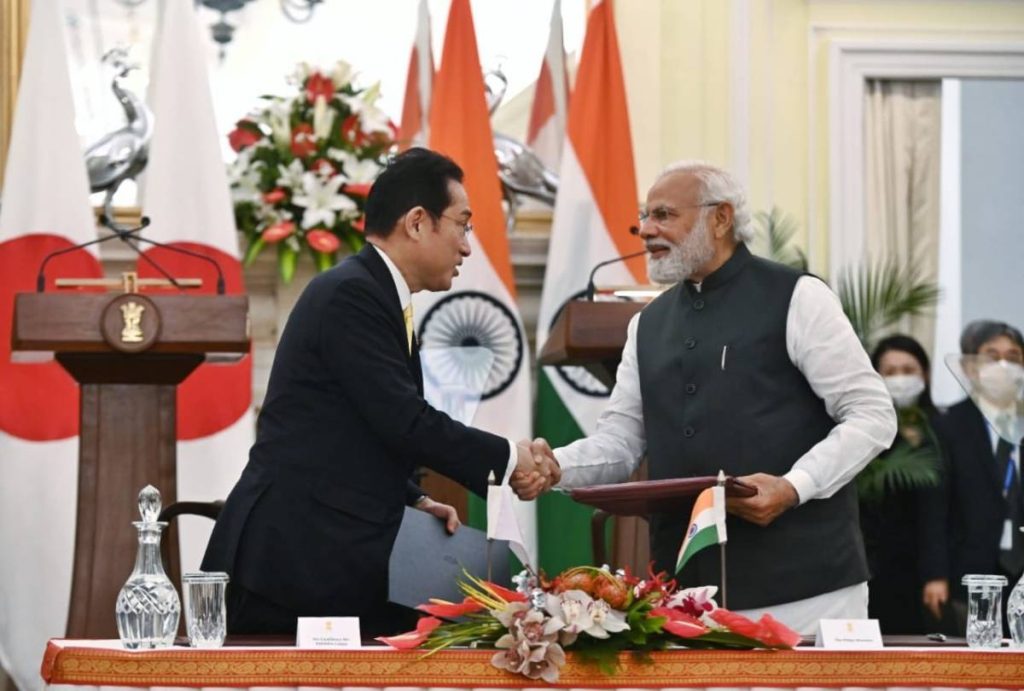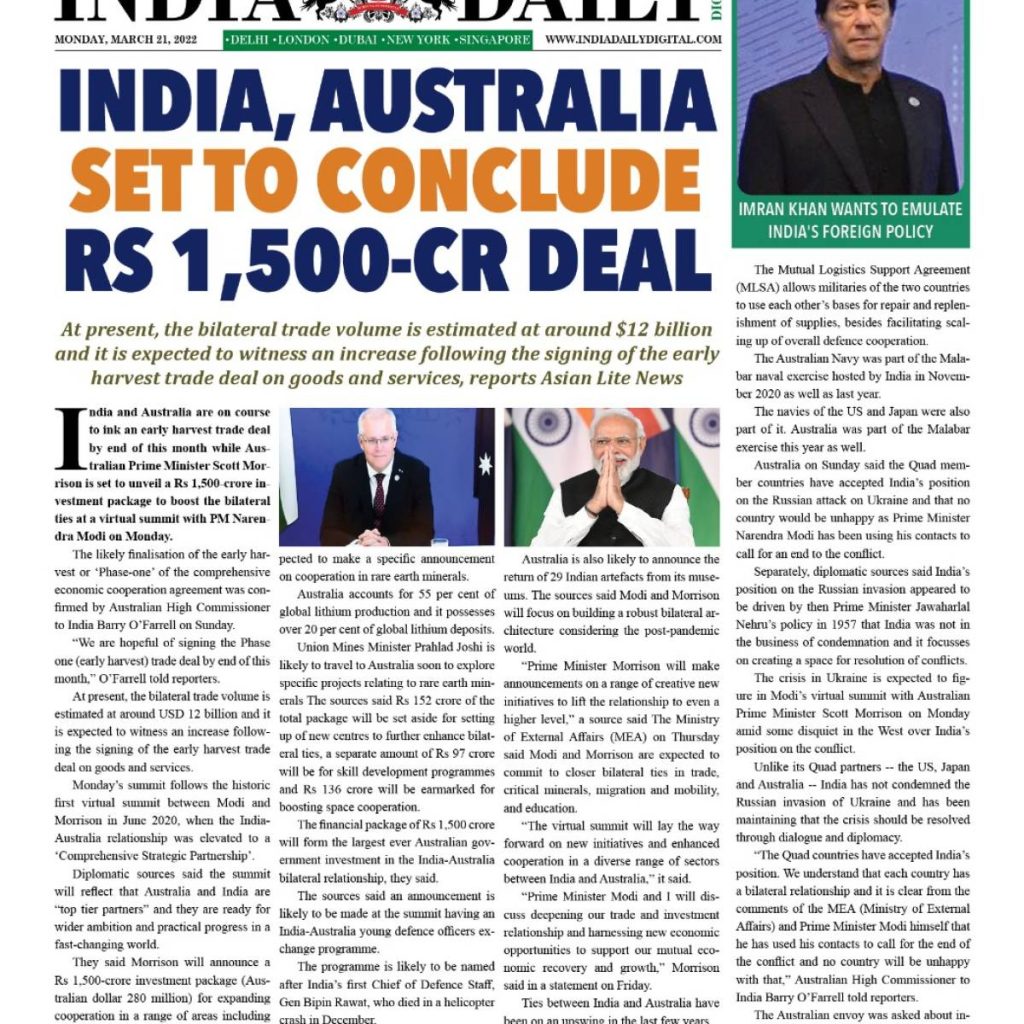
At present, the bilateral trade volume is estimated at around $12 billion and it is expected to witness an increase following the signing of the early harvest trade deal on goods and services, reports Asian Lite News
India and Australia are on course to ink an early harvest trade deal by end of this month while Australian Prime Minister Scott Morrison is set to unveil a Rs 1,500-crore investment package to boost the bilateral ties at a virtual summit with PM Narendra Modi on Monday.
The likely finalisation of the early harvest or ‘Phase-one’ of the comprehensive economic cooperation agreement was confirmed by Australian High Commissioner to India Barry O’Farrell on Sunday.
“We are hopeful of signing the Phase one (early harvest) trade deal by end of this month,” O’Farrell told reporters.
At present, the bilateral trade volume is estimated at around USD 12 billion and it is expected to witness an increase following the signing of the early harvest trade deal on goods and services.
Monday’s summit follows the historic first virtual summit between Modi and Morrison in June 2020, when the India-Australia relationship was elevated to a ‘Comprehensive Strategic Partnership’.
Diplomatic sources said the summit will reflect that Australia and India are “top tier partners” and they are ready for wider ambition and practical progress in a fast-changing world.
They said Morrison will announce a Rs 1,500-crore investment package (Australian dollar 280 million) for expanding cooperation in a range of areas including clean technology and critical minerals and the space sector.
At the summit, the two sides are expected to make a specific announcement on cooperation in rare earth minerals.
Australia accounts for 55 per cent of global lithium production and it possesses over 20 per cent of global lithium deposits.
Union Mines Minister Prahlad Joshi is likely to travel to Australia soon to explore specific projects relating to rare earth minerals The sources said Rs 152 crore of the total package will be set aside for setting up of new centres to further enhance bilateral ties, a separate amount of Rs 97 crore will be for skill development programmes and Rs 136 crore will be earmarked for boosting space cooperation.
The financial package of Rs 1,500 crore will form the largest ever Australian government investment in the India-Australia bilateral relationship, they said.
The sources said an announcement is likely to be made at the summit having an India-Australia young defence officers exchange programme.
The programme is likely to be named after India’s first Chief of Defence Staff, Gen Bipin Rawat, who died in a helicopter crash in December.
The two sides are also expected to firm up a letter of intent on the migration and mobility of citizens of the two countries.
Australia is also likely to announce the return of 29 Indian artefacts from its museums.
The sources said Modi and Morrison will focus on building a robust bilateral architecture considering the post-pandemic world.
“Prime Minister Morrison will make announcements on a range of creative new initiatives to lift the relationship to even a higher level,” a source said The Ministry of External Affairs (MEA) on Thursday said Modi and Morrison are expected to commit to closer bilateral ties in trade, critical minerals, migration and mobility, and education.
“The virtual summit will lay the way forward on new initiatives and enhanced cooperation in a diverse range of sectors between India and Australia,” it said.
“Prime Minister Modi and I will discuss deepening our trade and investment relationship and harnessing new economic opportunities to support our mutual economic recovery and growth,” Morrison said in a statement on Friday.
Ties between India and Australia have been on an upswing in the last few years.
In June 2020, India and Australia signed a landmark deal for reciprocal access to military bases for logistics support.
The Mutual Logistics Support Agreement (MLSA) allows militaries of the two countries to use each other’s bases for repair and replenishment of supplies, besides facilitating scaling up of overall defence cooperation.
The Australian Navy was part of the Malabar naval exercise hosted by India in November 2020 as well as last year.
The navies of the US and Japan were also part of it.
Australia was part of the Malabar exercise this year as well.
Australia on Sunday said the Quad member countries have accepted India’s position on the Russian attack on Ukraine and that no country would be unhappy as Prime Minister Narendra Modi has been using his contacts to call for an end to the conflict.
Separately, diplomatic sources said India’s position on the Russian invasion appeared to be driven by then Prime Minister Jawaharlal Nehru’s policy in 1957 that India was not in the business of condemnation and it focusses on creating a space for resolution of conflicts.
The crisis in Ukraine is expected to figure in Modi’s virtual summit with Australian Prime Minister Scott Morrison on Monday amid some disquiet in the West over India’s position on the conflict.
Unlike its Quad partners — the US, Japan and Australia — India has not condemned the Russian invasion of Ukraine and has been maintaining that the crisis should be resolved through dialogue and diplomacy.
“The Quad countries have accepted India’s position. We understand that each country has a bilateral relationship and it is clear from the comments of the MEA (Ministry of External Affairs) and Prime Minister Modi himself that he has used his contacts to call for the end of the conflict and no country will be unhappy with that,” Australian High Commissioner to India Barry O’Farrell told reporters.
The Australian envoy was asked about increasing disquiet in the West over India’s position on the Russian invasion of Ukraine and its purchase of discounted crude oil from Russia.
On Friday, Morrison said the situation in Ukraine and its implications for the Indo-Pacific will figure in his virtual summit with Modi.
The diplomatic sources cited above said India’s position on Ukraine is reflective of Nehru’s policy in 1957 that India was not in the business of condemnation and it was in the business of creating a space for resolving conflicts.
“No one has ever accused India of supporting what is going on in Ukraine. What India seems to be doing is trying to operate within the policy outlined by Nehru 65 years back,” said a source.
Referring to Japanese PM Fumio Kishida seeking Modi’s cooperation in convincing Russian President Vladimir Putin to maintain a free and open international order, the sources said it reflects India’s significance and expectations from it.

The situation in Ukraine figured prominently in summit talks between Modi and Kishida on Saturday.
After the talks, Kishida said at a media briefing that the Russian invasion of Ukraine has “shaken” the roots of international order and asserted that attempts to alter the status quo by using force in any region should never be tolerated.
There has been increasing uneasiness in the West over India deciding to purchase discounted crude oil from Russia.
White House Press Secretary Jen Psaki said on Tuesday said that India taking the Russian offer of discounted crude oil would not be a violation of the US sanctions on Moscow but underlined that countries should also think about “where you want to stand” on the Russian action.

An India-Japan joint statement, issued after talks between Kishida and Modi on Saturday, said the two leaders expressed serious concern over the conflict and pitched for an immediate end to violence and resolution of the situation through dialogue and diplomacy.
After the conflict began, Modi has held three telephonic conversations with Russian President Putin and spoke to Ukrainian President Volodymyr Zelenskyy twice.
On March 3, the leaders of the Quad countries held a virtual meeting to discuss the Ukraine crisis.
A joint readout released by the White House had said that US President Joe Biden, Modi, Morrison and Kishida discussed the ongoing conflict and humanitarian crisis in Ukraine besides assessing its “broader implications”.
“They agreed to stand up a new humanitarian assistance and disaster relief mechanism which will enable the Quad to meet future humanitarian challenges in the Indo-Pacific and provide a channel for communication as they each address and respond to the crisis in Ukraine,” it said.
ALSO READ-India steps up game in Sri Lanka


